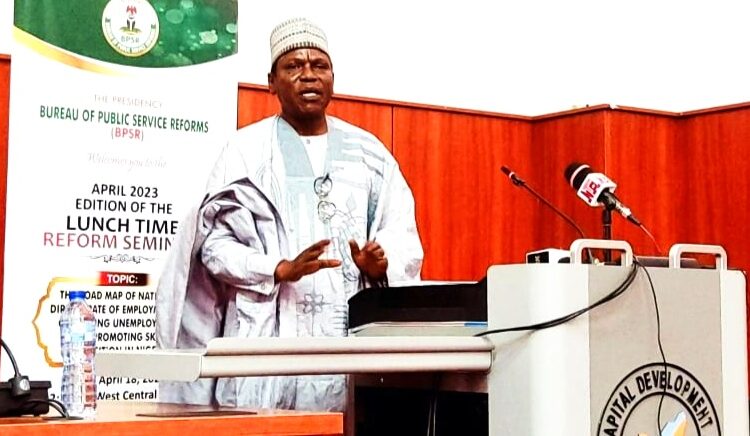The director-general of the National Directorate of Employment (NDE), Mallam Abubakar Nuhu Fikpo, has said that Nigeria has recorded an unprecedented level of achievement in the efforts to combat mass unemployment and poverty among unemployed and vulnerable groups, especially women and youths.
Speaking during the Bureau of Public Service Reforms (BPSR) Lunch Time Seminar in Abuja, Fikpo said the efforts have translated into the creation of millions of skilled labour in micro and small enterprises in both rural and urban communities in the formal and informal sectors of the economy, thereby absorbing and engaging unemployed youth and women in decent employment.
He said, “The NDE came into being in 1986 out of the need to combat the problem of mass unemployment which was on the increase due to certain prevalent socio-economic factors.
“These factors still subsist, thereby making the Directorate more relevant than ever before. The NDE Management, therefore, stepped up innovative initiatives toward creating more employment opportunities for unemployed Nigerians.”
Furthermore, he said under the current administration of President Muhammadu Buhari, substantial fund was invested immediately after the COVID-19 pandemic, and deliberate and conscious commitment was made to implement strategy to cushion and mitigate the effects of the pandemic through various palliative measures which included the 774,000 jobs, conditional and non-conditional cash transfers, among others.
“His Excellency, the President has graciously approved the allocation (with corresponding funds for the completion of a mighty seven-story building with basement to NDE as its permanent corporate Headquarters. The building was one of the sized properties from corrupt persons by the Economic and Financial Crime Commission (EFCC) located at a choice area in Gudu District, FCT Abuja.
“This is a sure journey towards the realization of President Buhari’s desire to lift Nigerians out of poverty, which the Directorate already keyed into in order to guarantee sustainable employment and wealth creation opportunities for the growing number of unemployed Nigerians,” he stated.
On how NDE is target-fully developing its job creation schemes and programmes, as well as structurally executing them considering the realities of the resources at its disposal for the herculean task, he said, “In designing the employment creation programmes, the National Directorate of Employment takes cognizance of the following factors: The declining interest of youths in the agricultural sector which had traditionally provided the bulk of employment, particularly in the rural areas. The deteriorating condition of urban and rural infrastructure due to the dearth of foreign exchange earnings to procure and maintain construction machinery and equipment as against the surplus labour (unemployed hands) available in the country.”
Fikpo added that the expectations of graduates of tertiary institutions were for non-existent white-collar jobs while their backgrounds do not prepare them to take advantage of the opportunities for self-employment in the formal and informal sectors of the economy.
“The potentials of the informal sector and the traditional apprenticeship system of skills acquisition to generate self-employment. The need to counsel the unemployed for attitudinal re-orientation towards embracing self-employment and self-reliance as against white collar jobs,” he added.
He lamented that the Directorate’s weak funding and its implication in addressing the dynamic challenges of unemployment among Nigerians, called for collaborative initiatives with relevant stakeholders.
He said, “In recognition of the foregoing factors, the programmes and schemes seek to empower beneficiaries with skills that have high employment potentials using the following strategies: registration of interested persons. guidance and counseling. life skills training, hands-on training. entrepreneurship development training, business start-up/resettlement, mentorship, deradicalization, monitoring and evaluation (M&E), and tracer study. impact assessment.
“The programmes/schemes of the Directorate are targeted at all unemployed persons which include: youths and women, graduates of tertiary institutions, school leavers, school dropouts, persons with special needs older persons/retirees.
“The under-listed interventions provide the target group with the following: practically oriented skills acquisition, theory and learning for maximum skills and competencies development, result oriented exposure (based on set targets), participatory experience, demand-driven skills, Market focused and economically viable skills, people-centered innovations (based on individuals’ inherent potentials).”





